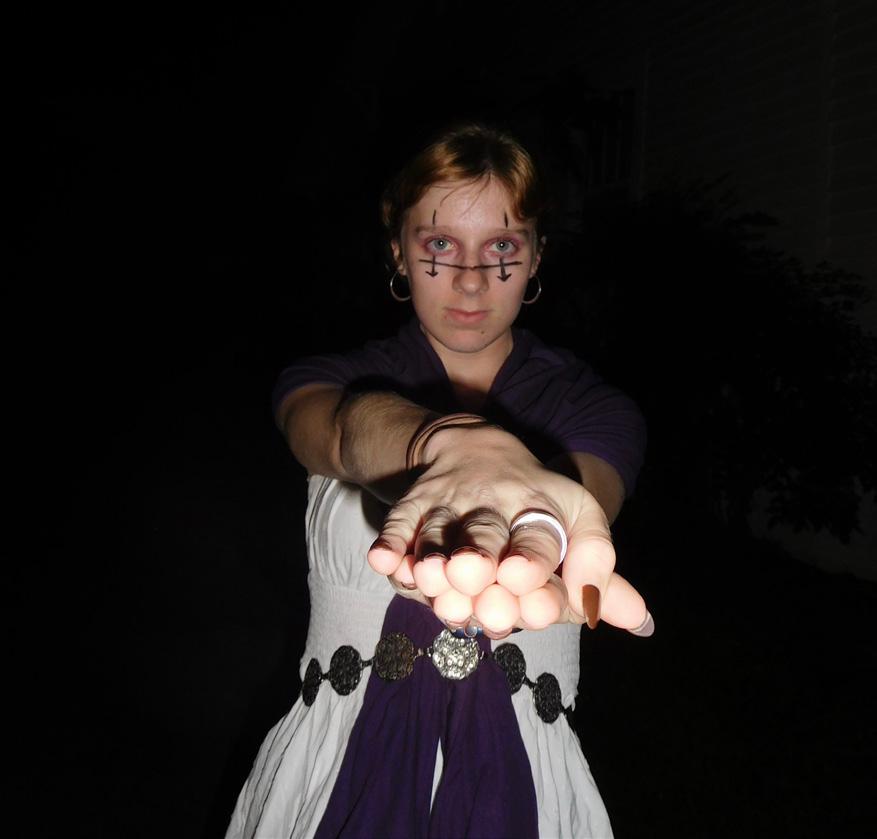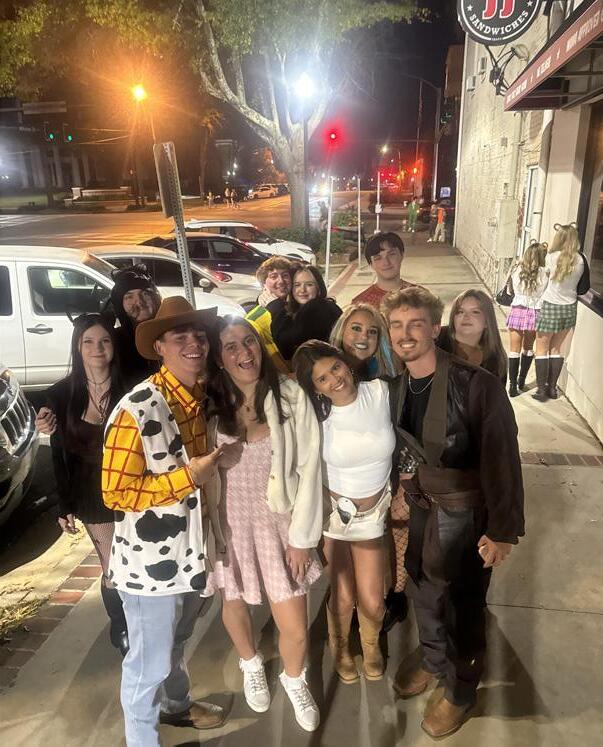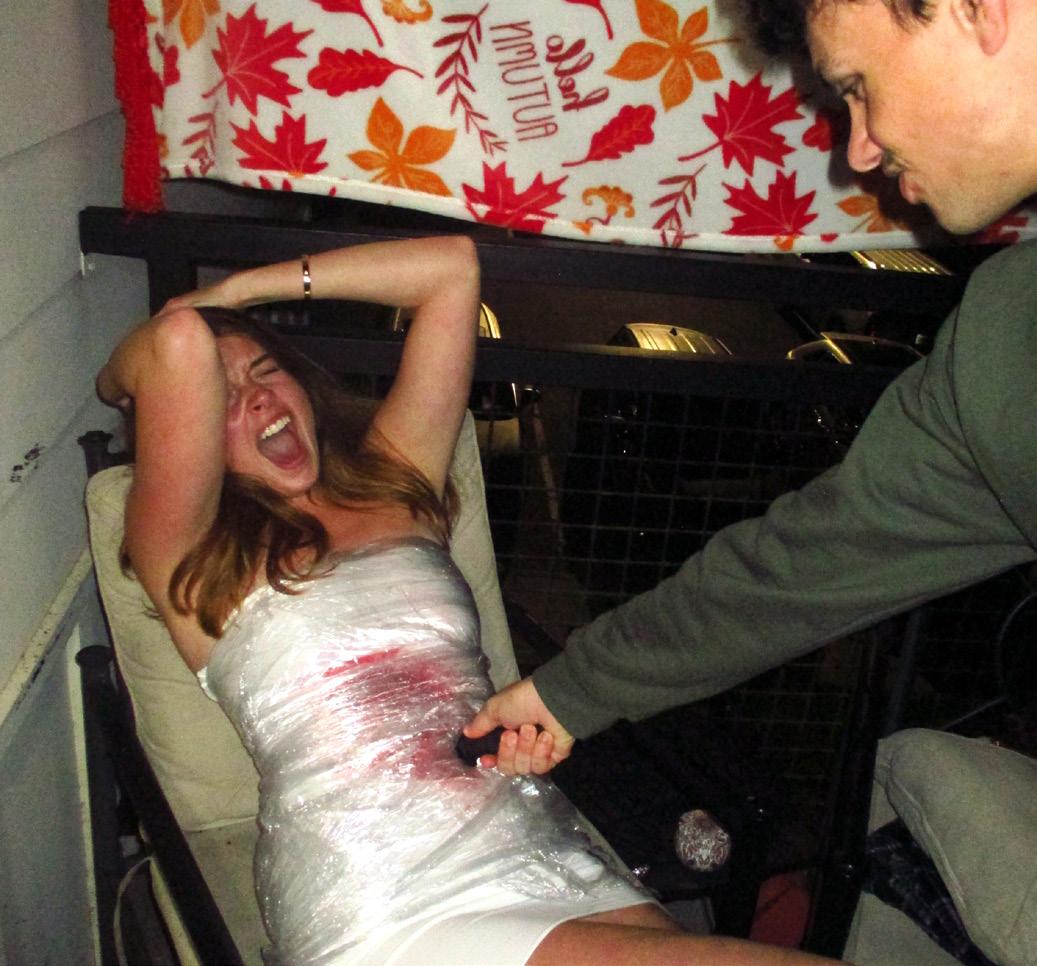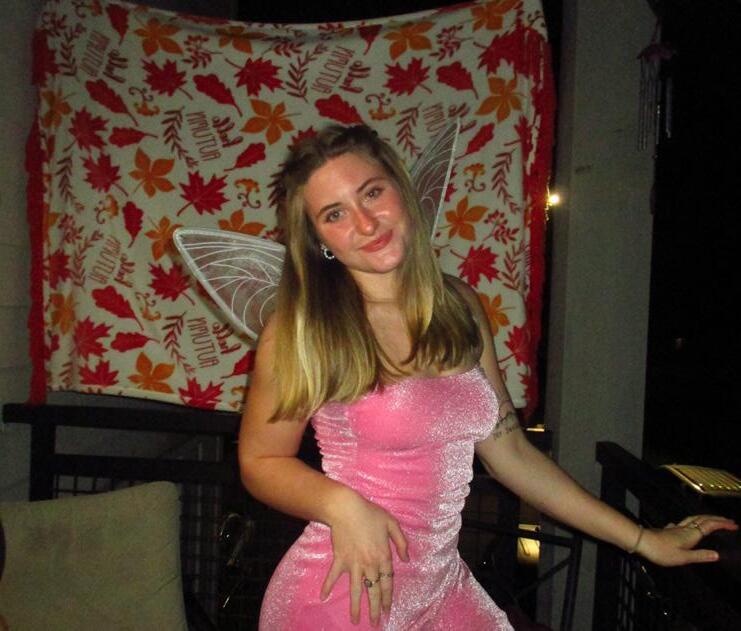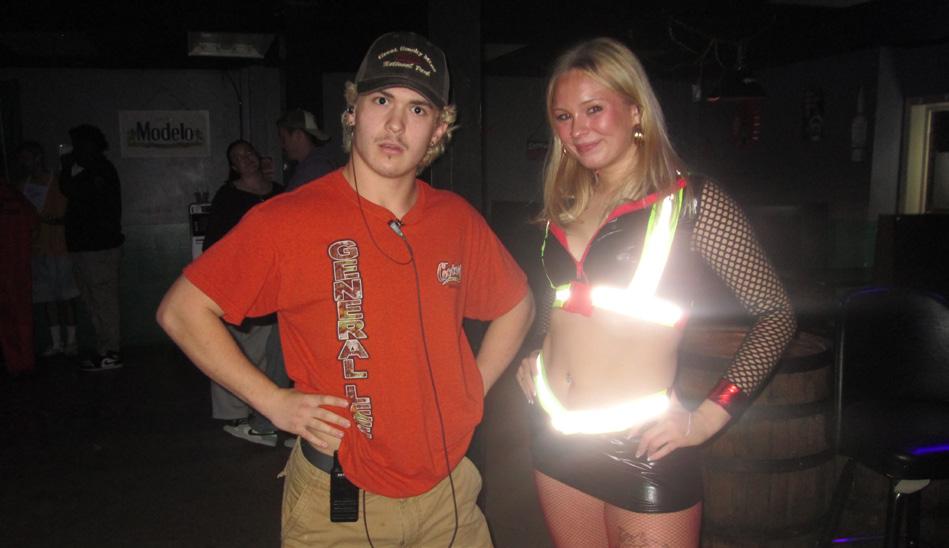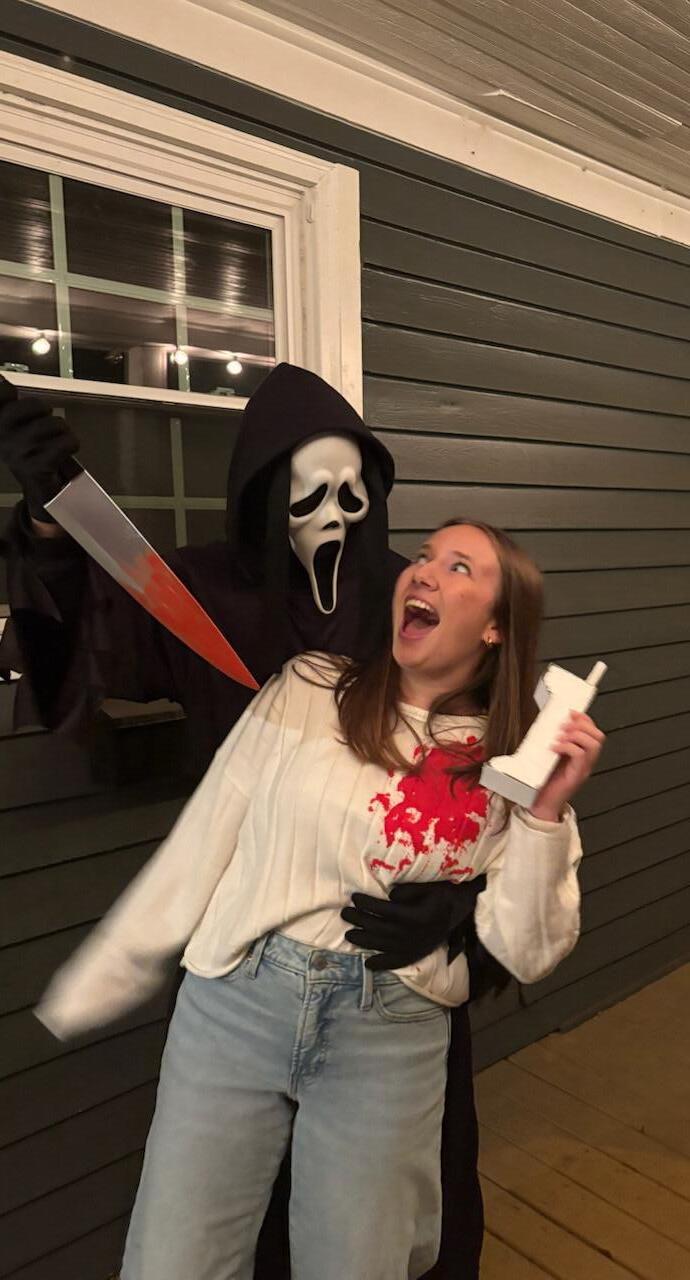


The Official Student Newspaper of Georgia College & State University
Single Copies Free




Single Copies Free
Emma Tyler Asst. News Editor
On Oct. 29, the departments of Art, Theater and Dance, Communication, English and Music combined to demonstrate a free event for the public known as Artober which offered demonstrations, live music, readings, engaging displays, ice cream, silent auctions and much more.
Each floor of Ennis Hall was designated for certain events, making the entire building fully dedicated to this
artistic extravaganza.
Although the front porch was supposed to have student organizations with tables and a saxophone quartet, rain swept these plans away and moved the groups onto the third floor.
A new silent auction featuring items such as books and paintings were donated from faculty and displayed on the first floor where all proceeds benefited their home department. There was also an ice cream social where ice cream was served in student
Sydney Williams Asst. A&L Editor
As daylight saving time came to an end on Nov. 2, GCSU students are preparing for earlier sunsets and the shift in routine that comes with “falling back.” While the extra hour of sleep may be welcomed by some, many students feel that the seasonal time change disrupts their schedules and affects their energy throughout the day.
Daylight saving time has been part of American life for decades.
According to National Geographic, “In the United States, the federal government first standardized the twice-yearly clock change in 1966. Today, people in almost all U.S. states—with the exceptions being Hawaii and most of Arizona—‘springs forward’ in March and ‘falls back’ in November.”
The shift was originally introduced to conserve energy by extending daylight during the evening hours, but its modern relevance is often debated. As people rely more on artificial light and technology, many question whether the benefits still apply.
On campus, students are already noticing the effects of shorter days. Early morning classes are brighter, but evenings arrive faster, sometimes before students finish their activities or walk back from class.
For students with late afternoon or evening schedules, the change can also affect productivity and safety. The sun now sets around 6:30 p.m., meaning students leaving classes or campus events often walk home in the dark.
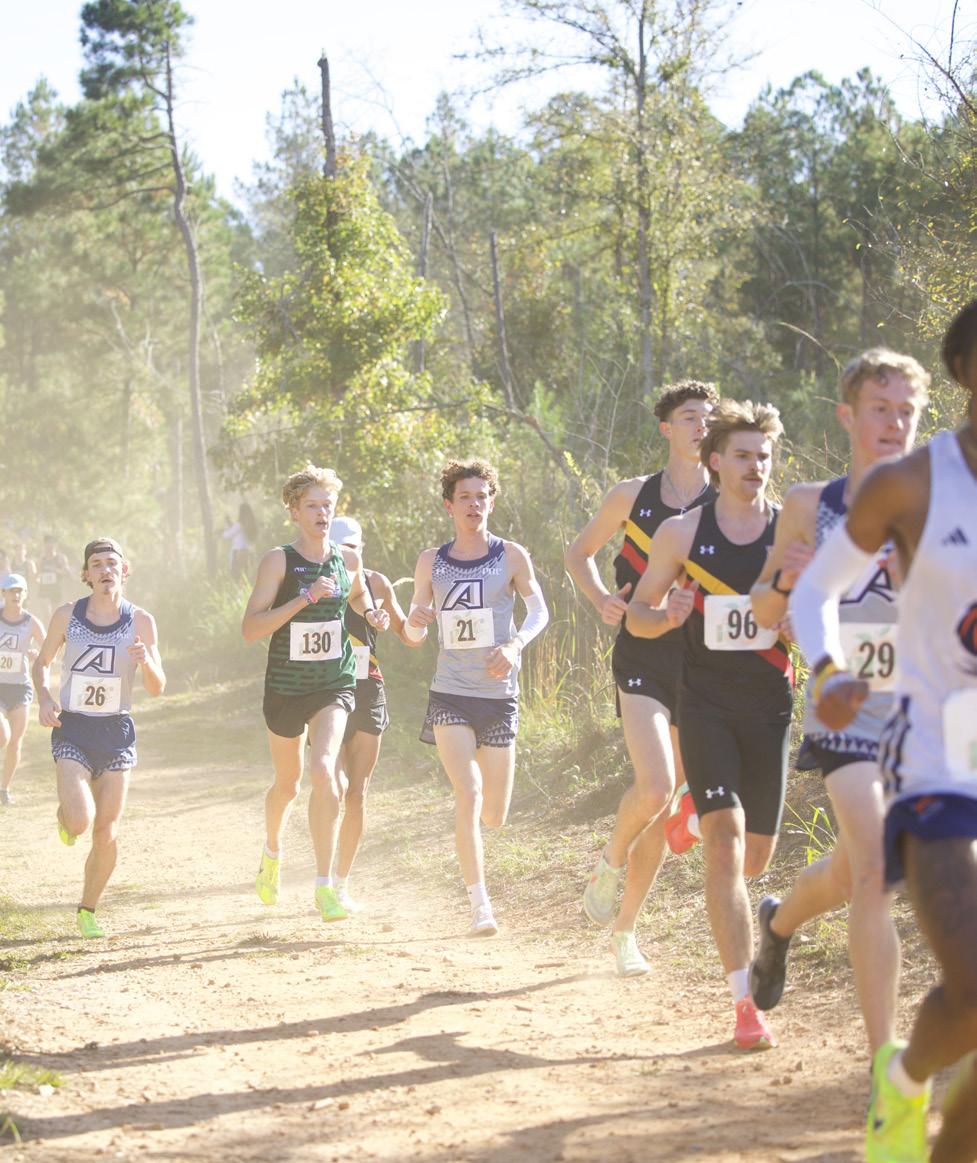
handmade ceramic cups.
The second floor displayed student research and live demonstrations while the third floor demonstrated social engagement in art and other works curated by the Museum Studies III class.
Furthermore, a new faculty exhibition by Kristoffer Johnson and Griffin Allman was presented in the Underwood House Gallery.
The Art department brought many festivities to Artober including the Art Capstone Exhibition, Artist Hayden
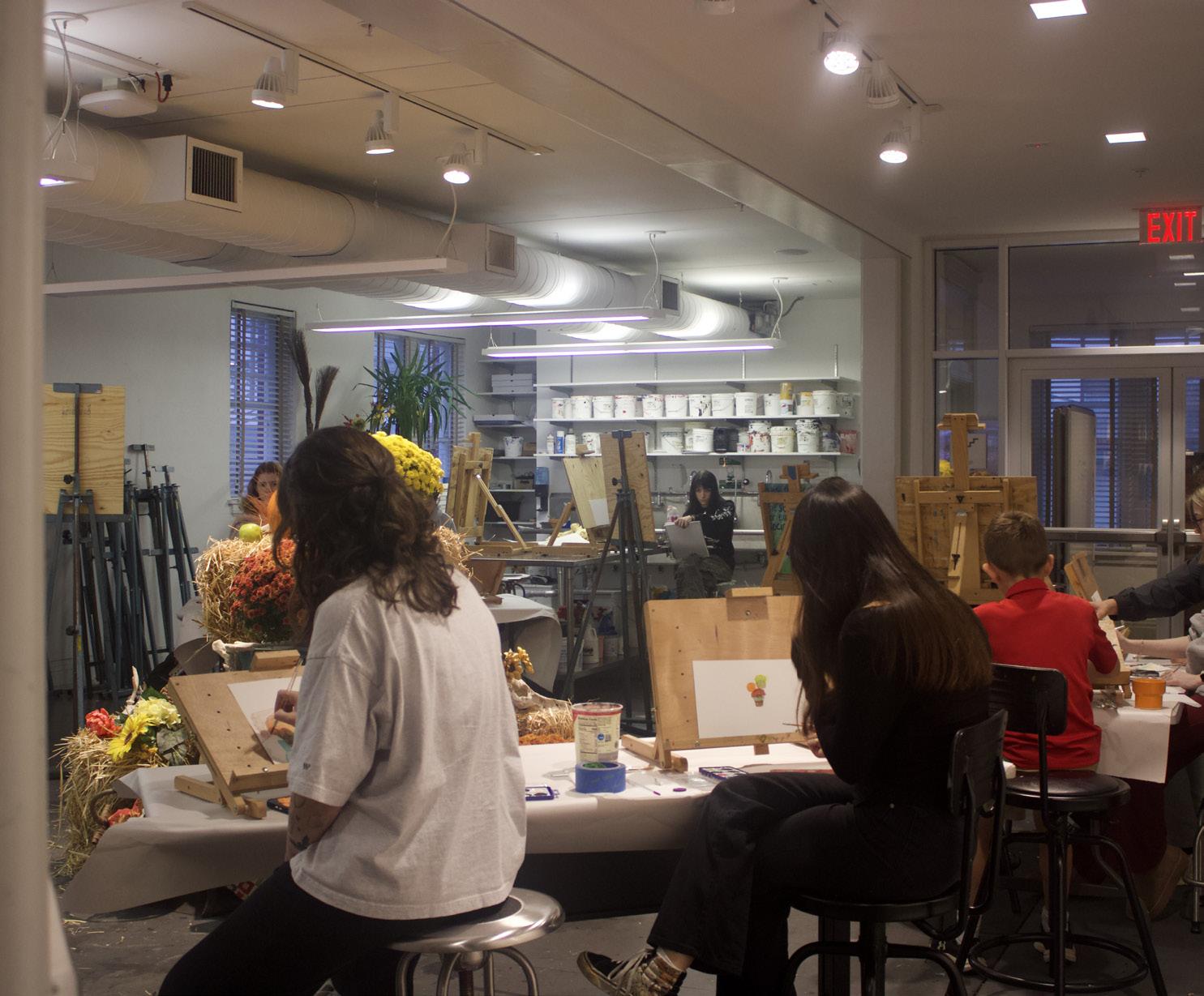
Rylee Holland Managing Editor
Due to the government shutdown that began Oct.1 of this year, the Supplemental Nutrition Assistance Program has also shut down in Georgia and the United States as of Saturday, Nov. 1.
SNAP is the largest anti-hunger program in the United States, providing monthly benefits via Electronic Benefits Transfer to help eligible individuals and families buy food.
According to the College SNAP Project, 83,026 college students in Georgia are enrolled in SNAP, meaning those indi-
viduals may not be able to afford groceries this Nov. and for however long the shutdown lasts.
“It doesn’t affect me personally but I am concerned with the amount [of people] that will likely go hungry due to the lack of funding of SNAP,” said Jacob Cooper, a senior management major.
Many GCSU students share the same concern, either for themselves or other students who need financial help.
“The loss of SNAP benefits is not only hurting those who need it, it creates a huge economic issue as well,” said Lloyd Addington, a sophomore art history major.
Not only can this affect GCSU students, Milledgeville can be affected too. According to population data as of 2025, Milledgeville has a poverty rate of 41.3%, far exceeding the national average.
This high poverty level suggests a large number of people are eligible for and receive SNAP benefits.
“I do think SNAP benefits help Milledgeville locals,” Addington said. “Milledgeville is a rather small community and not only does a large portion of the population need SNAP EBT cards to better their wellbeing, it also supports the very few stores we do have here.”
See SNAP | Page 3
Bryan Cade Asst. Sports Editor
Georgia College & State University men’s and women’s cross country competed in the Peach Belt Conference Championship on Saturday, Oct. 25, with the women’s 5K race beginning at 9 a.m. and the men’s 8K race beginning at 10:15 a.m.
This race marked GCSU’s first time hosting the cross country Peach Belt Conference Championship since 2016, when the Bobcats host-
ed at Council Farms.
However, due to the brand-new cross-country course installed on campus, GCSU hosted the event directly on campus, with the race beginning on the intermural soccer fields.
Beginning with the opening race, the Bobcat women’s team posted a fourth-place finish out of the eleven schools competing. It was the third consecutive fourth-place finish for the women’s cross country team, as they
accumulated 109 points.
The Flagler College Saints finished in first, with 21 points, and collected a Peach Belt Conference record of eight consecutive conference championship victories. The Augusta University Jaguars and the University of North Georgia Nighthawks were the other two teams ahead of the Bobcats, respectively.
GCSU’s Emma Shanklin finished in first for the Bobcats; however, finishing one spot outside of being named to the all-conference team, placing 16th with a time of 19:27.7. Lorena Cazora was 30th, with an effort of 20:03.3, followed by Abbie Brown in 31st place at 20:08.0. Two Bobcats set personal bests, as Maddie Reese Smith finished in 32nd with a time of 20:09.4, and Rhone Marshall with a 22:19.0 effort and 75th place finish. Bobcats’ Campbell Smith was named to the AllPeach Belt Conference Sportsmanship Team.
See PEACH BELT | Page 4
Continued from page 1
Seth Cook, a lecturer of photography, explained the physics behind the camera obscura demo and why he believes it is fundamen-
who may not understand how basic a camera can be and the physics of it,” Cook said. “We wanted to put that together and actually demonstrate it.”
This demo allowed the public to understand the inner workings of
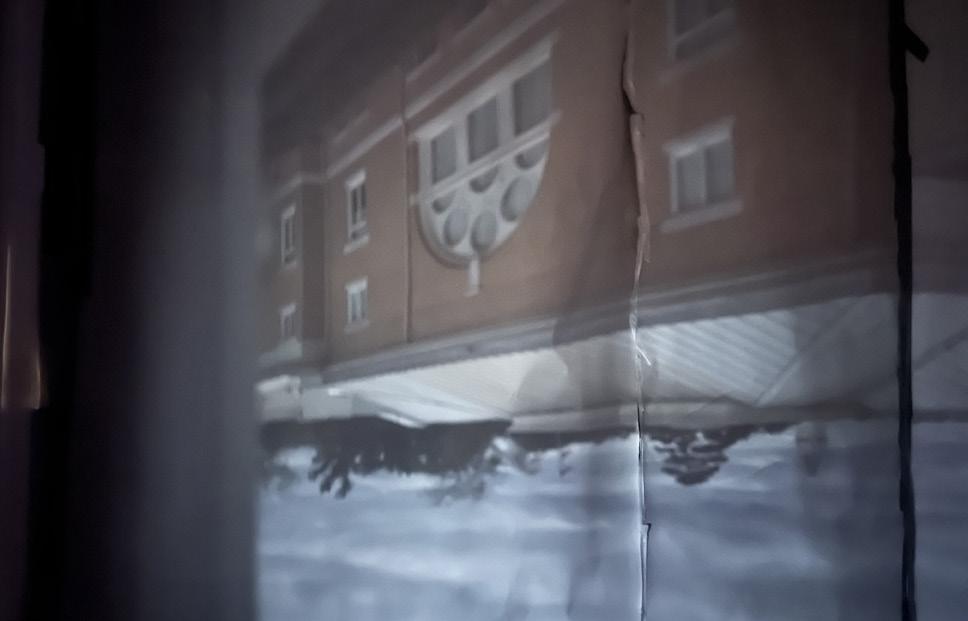
tal for people to learn.
“We wanted to show the students, faculty and honestly anyone else
a camera without ever having to take a course about it in school. Not only do these demon-
strations serve as a form of enjoyment, but they are also purposely designed to be educational.
The Theater and Dance department displayed a living museum, MLM is for Murder preview, a sneak peek of the Nutcracker and short dance films that reimagine undergraduate choreography through camera work, unique location choices and editing techniques.
The living museum consisted of cast members from The Importance of Being Earnest in full costume while sharing insights on the production. The cast of MLM is for Murder performed a short scene as a teaser for their upcoming show in November.
The Music department not only introduced their saxophone quartet inside the building which played jazz songs throughout the evening, they also hosted a flute choir in the Leland Gallery. A storytelling ensemble performance, movie screening and other storytelling occurred on behalf of the Communications department. In relation, the English department hosted a poetry club workshop and MFA five-minute sample readings. Matthew Forrest, interim chair and professor of both art and printmaking, organized Artober for its second ever production.
“It’s a way to collab-
Rylee Holland Managing Editor
Dr. Kerry Neville, the Interim Chair of the Department of Communication and Associate Professor of Creative Writing, has released her third book, a memoir called “Momma May Be Mad.”
The memoir was released on Oct. 21 of this year and has already received much praise.
Neville has written many essays about her recovery and growth from anorexia, alcohol use disorder and bipolar disorder, as well as essays about how her time in Ireland grew her, like the one published in the Irish Times, “The unlikely love that blossomed between me and my múinteoir.” She decided she wanted to move from essays to creating a memoir.
“I wanted to try to recreate the arch of recovery,” Neville said.
After five years of writing, making var-
ious drafts and using different forms, Neville was finally able to get her memoir just right.
“Momma May Be Mad” is the story of Neville’s recovery from things that many young
ally undiagnosed bipolar disorder), Neville said it felt like no one else was struggling around her.
“Nobody talked about it, I didn’t see anyone else struggling,” Neville said. “I hope that by sharing
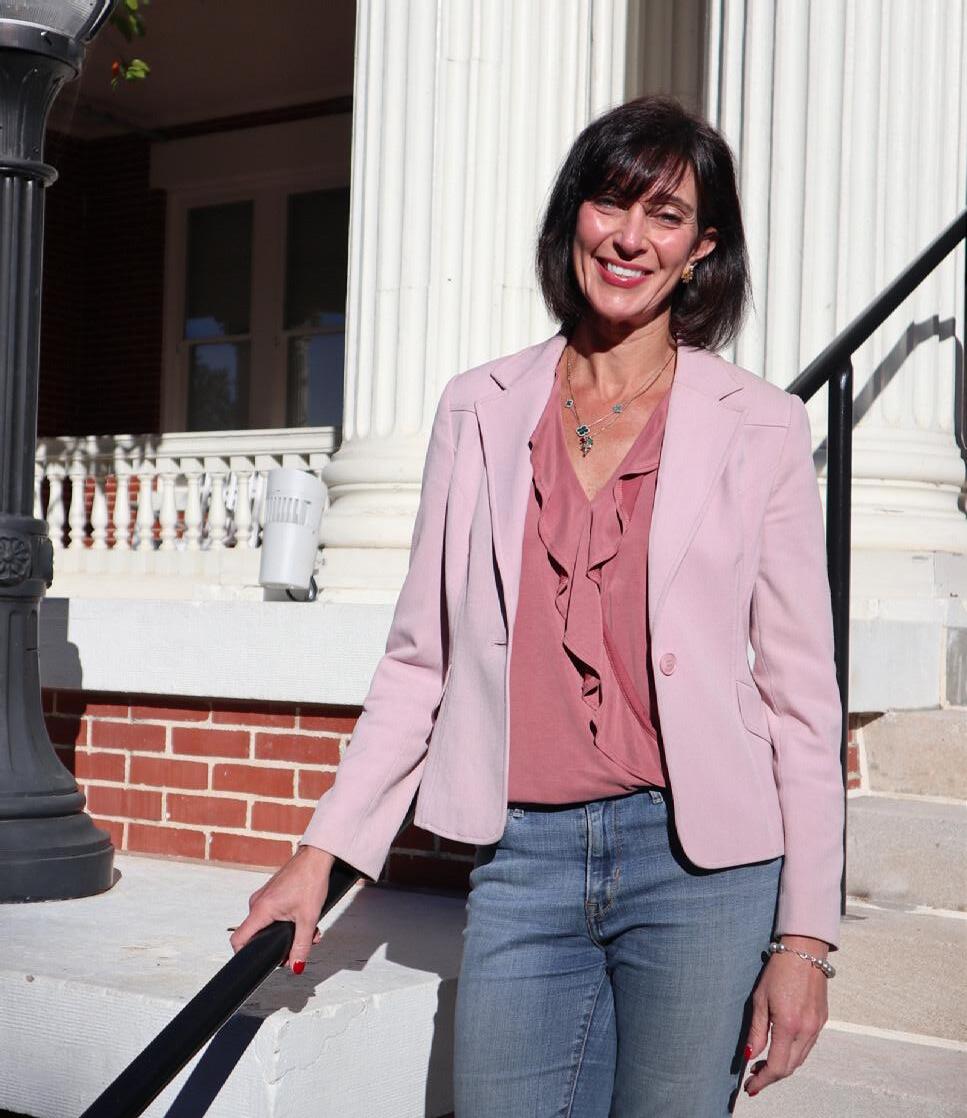
people deal with in different ways. When she was struggling with “depression” in undergraduate school (which was actu-
Mary Ciucevich..............
Rylee Holland..................
Julia Jensen......................
Amelia McEwen............
Editor in Chief
my story, that people, maybe college students, that are going through the same mental health struggle will feel as if they

Managing Editor
Art Director
News Editor
Emma Tyler.......................
Asst. News Editor
Benjamin Clark...............
Sports Editor
Bryan Cade.......................
Kate Walker...............
Sydney Williams.............
Isabella McComis..........
Asst. Sports Editor
Arts & Life Editor
Asst. Arts & Life Editor
Digital Media Editor
Reaghan Shehee............
Reagan Robinson..........
Haley Quimby..................
Mikkel Christensen.......
Digital Media Editor
PR Manager
Ad Sales Manager
Faculty Adviser
orate and showcase not only student artwork, but also faculty collaboration on the event and to show faculty mentorship with their students, like what they’re doing in their classes,” Forrest said. “It was a way to kind
cal community, not only the campus community.”

of highlight everything and also make it open to the public so that we can engage with the lo-
are a little less alone.”
Neville’s memoir not only dives into her own experiences, but the scientific, medical and literary research that goes into her illnesses and her motherhood.
“The way I wrote the book is trying to provide the whole story of how I came to understand my journey,” Neville said. “I love understanding some of the motivations and the science behind who we are.”
Neville believes it is very important for everyone, especially writers, to be diverse in their knowledge.
“If you aren’t diverse in your knowledge, if you’re a writer then you’re only going to be writing what you know,” Neville said. “When we think we know everything it’s revealed that, in fact, we know very little.”
This philosophy facilitates a space for Neville to always be growing in herself and in her writing.
On Nov. 5, Dr. Nev-
ille will be a part of The Visiting Writers Series that GCSU’s English Department hosts. Beginning at 6:30 p.m. in the Pat Peterson Museum Education Room, Dr. Neville will be doing a reading followed by a Q&A and book signing.
“Ireland is a part of my recovery story and the last third of the book is set in Ireland,” Neville said. “So there will be some surprise musical guests at my reading.”
She divulged there may even be some singing from herself and that she will encourage the audience to sing along.
Neville will also be joining the Psychology Club on Nov. 6 at 6 p.m. in the A&S Auditorium.
The club invited her to talk about her story and how she was able to push through.
Neville discussed how she had a psychiatrist who once told her she was a “hopeless case,” so she decided to use it as motivation for her future in-
In hopes of hosting Artober annually, the event demonstrates a vibrant evening in which the arts can be celebrated, students and faculty can display their work and the public can learn new topics through hands-on demos.
Neville I wanted to try to recreate the arch of recovery,
-Kerry
stead of believing the lie. The professor’s book is available for purchase in many different ways, the most accessible way for students, faculty and staff being the Barnes and Noble Bookstore at GCSU. If sold out at the bookstore, they will order more. Her book is also available in the regular Barnes and Noble, Walmart, Amazon, in Ireland and other countries and much more.
“Yes I have been diagnosed with bipolar disorder, yes I have alcohol use disorder, yes I had an eating disorder, and I have a very long list of the diagnostic codes,” Neville said. “But those are just codes, that doesn’t define who you are and what you are capable of.”
@TheColonnade @TheColonnade

Contributing writers are always welcome at The Colonnade. Contact thegcsucolonnade@gmail. com for more information.
If you have a tip or wish to contact The Colonnade, email thegcsucolonnade@gmail. com or message our Instagram @thecolonnade.
The Colonnade is now primarily published online. Read at issuu.com/thecolonnade or on bobcatmultimedia.com.
Continued from page1
While the pause on SNAP benefits affects those enrolled, it also is said to affect every grocery buyer in the country.
According to Vote In or Out, “Each SNAP dollar creates about $1.50 to $1.80 in local economic activity.
When that flow stops, up to $16 billion vanishes from the economy.”
The same article said grocery prices are up three percent this year.
“Even a one-month pause could push prices another 1 percent higher while states lose hundreds of millions in sales tax revenue,” the Vote In or Out article said.
The debate between whose fault this is continues. Democrats say Senate Republicans are at fault, and Republicans say Senate Democrats are at fault.
The shutdown beginning Oct.1 began from partisan disagreements over federal spending levels, foreign aid rescissions and health insur-
Amelia McEwen News Editor
The Georgia Power company has recently requested a large amount of electricity to power data centers across the state, which has raised ethical and environmental questions among students and staff at GCSU.
“It’s hard to think about all the amazing things AI could potentially do for humans if our future generations won’t be able to see them accomplished,” said Madi Hummel, a junior marketing major. “I’m hopeful that as we begin to understand the effects AI has on our society, we’ll be able to find solutions to make the data centers more sustainable.”
Hummel recognizes the positive effects Artificial Intelligence can have on society, but is concerned about the negative long-term effects on the environment. The conversation of sustainability has been present following Georgia Power’s 10-gigawatt request for electricity.
The reasoning behind Georgia Power’s request is the exponential advancement of Artificial Intelligence. Society has seen a significant uptick in AI usage and the company is attempting to accommodate its energy requirements by requesting additional electricity for the next few years. The request surpasses any prior electricity request in the state’s history and according to the Southern Environmental Law Center, this is equivalent to powering 8.3 million homes.
“Of course, you know, we all need electricity as well for our modern daily lives and continuing to increase the power bills of consumers is something that certainly is and probably should be controversial,” said Allison VandeVoort, an environmental science professor. “Allocating the energy resources to AI instead, you could ask how many problems does that solve compared to people’s day-to-day needs.”
VandeVoort notes the controversy behind Georgia Power’s request, pointing out that consumer rates and the
ance subsidies. The senate cannot, and still has not come to an agreement, therefore the government is shut down.
“Republicans need to give more to the democrats in order to acquire the needed votes to pass the bill and reopen the government,” Cooper said. “It’s the majority’s job to work with the minority to make things work across the aisle.”
Other students disagree, saying it is the democrats who need to change their votes so that the government
is reopened. Although this discourse is tense, students agree that they all want the government to reopen and for processes to as well.
Until an agreement is reached by the senate, the shutdown will continue, putting people at risk of hunger.
“The best thing for students and members of the community to do is work together and help out where we can, whether that’s monetary or with work hours in kitchens or taking meals around to people that
need them,” Cooper said. If anyone is impacted by this, they may contact GCSU’s Mutual Aid organization.
The organization will be setting up a fundraiser soon for students and Milledgeville locals.
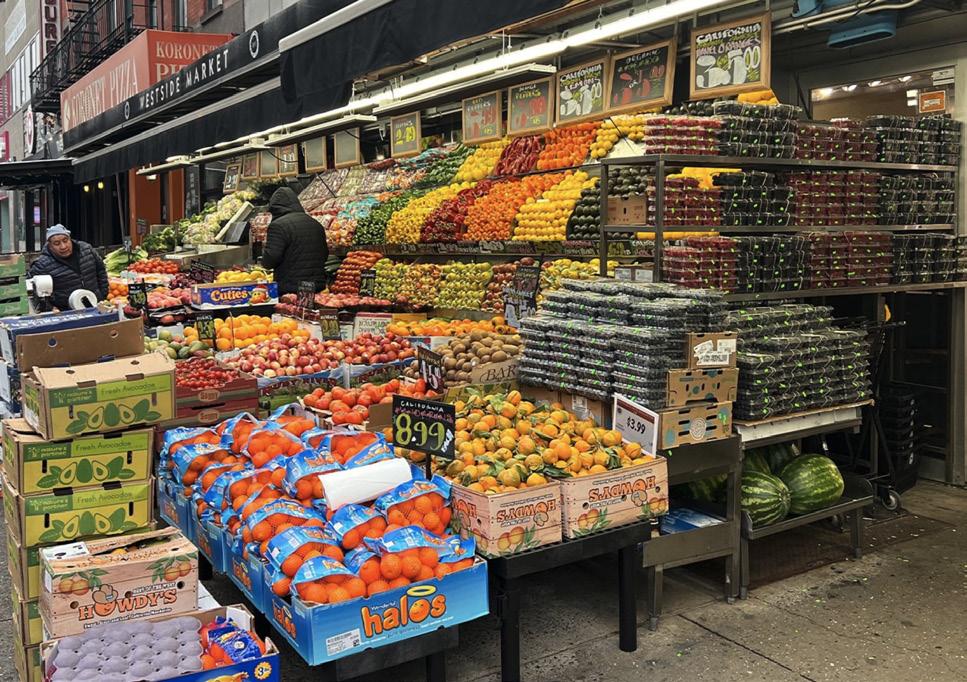
availability of power to everyday citizens would be allocated differently.
If approved, to accommodate this significant request, Georgia Power would need to build additional infrastructure. This will most likely lead to increased consumer rates over time, as the company has hiked rates in the past to fund projects. For example, according to the Georgia Public Service Commission, Georgia Power customers contributed upwards of $12 billion total to fund the expansion of the nuclear plant, Plant Vogtle. Along with increased consumer prices, other community concerns have been present. Individuals living in close proximity to AI data centers have experi-
lations on how much energy AI facilities can consume,” said Renata Maldonado-Tovar, a freshman English major. “It causes permanent damage to the environment. The efficiency of AI isn’t worth the mass energy it uses.”
Maldonado-Tovar emphasizes the need for stricter regulations on AI to promote sustainability. Though, despite its setbacks, this technology also has its positives.
“I believe that if AI can make significant improvements in healthcare, education or transportation, at the end of the day it does justify its energy use,” said Ashley Rea, a freshman Political Science major. “If it can make improvements in those

enced water scarcity.
“These data centers are requiring really large amounts of water, mostly for cooling their equipment,” VandeVoort said. “Their water demands are quite significant… so in order to fulfill the needs of 10 gigawatts of more power- that would be quite substantial.”
Georgia Power’s interest in advancing the usage of AI reflects its popularity on a global scale. It is widely used around the world and has been integrated into education systems, business practices and even healthcare. This advancement has not only impacted water availability. The expansion of AI has ripple effects on the overall health of the earth, ranging from erosion due to mining extractions, to polluted soil from electronic waste.
“I personally would support stricter regu-
three categories, then it can eventually find a way to give back to the environment to cancel out its energy use.”
Looking ahead, Georgia’s Public Service Commission will finalize its decision to approve Georgia Power’s request in December of 2025. This decision will impact the future of Georgia’s energy and electricity.
Until then, citizens can directly message the commissioners involved in the decision. Letting these commissioners know if you have any concerns allows the community and the government to build a stronger relationship. Whether you are in favor of the decision or not, it is recommended that you stay up to date on policy changes to ensure decisions are being made in the community’s favor.
Lucy Nunez Staff Writer
GCSU students share their opinions on the past Maxwell Student Union renovations, while the Student Government Association continues to evaluate its future plans.
The most recent renovation of the MAX, completed in the fall of 2023, amplified the modern look of the student union. Additional seating, television screens, food tailored to dietary restrictions and flashy signs were added.
“Being a senior and coming to the MAX with friends from time to time, I feel as if the renovations were much needed as they offer students more food variety,” said Nevaeh Jones, a senior psychology major. “All they offered my freshman year was the stir fry, pizza, burger and sandwich stations.”
GCSU’s students have mixed opinions on the food quality at the MAX. With the most recent renovation, there is the UCook station, VeganVille bar, a salad bar and two additional food stations offering unrelated meals every day.
“I appreciate the different variations of food provided, but feel as if the quality could be better,” said Odeya
Atar, a junior biology major. “I walk in and most of the time the pizza crust is very doughy.”
The MAX requires students to have a meal plan as freshmen, but beyond that, they can opt out if they desire.
“Eating at the Max for most of my meals isn’t my favorite, but if I decide to live near or on campus next year, I would most likely get another meal plan due to convenience,” said Brooklyn Colavito, a freshman psychology major.
The Max has come a long way with expanding their presence as well. Additional seating has offered students a spot to sit and chat with friends in between classes upstairs and downstairs in the Den.
“I enjoy being able to grab a quick bite with my friends at the Max and then go down to the Den to play pool,” said Nic Brezinski, a sophomore management major.
To provide a better dining experience, the Student Government Association is listening to students’ feedback and concerns about the MAX and is taking them seriously. Plans have been set to gather student feedback around the dining hall.
“We have heard concerns from students
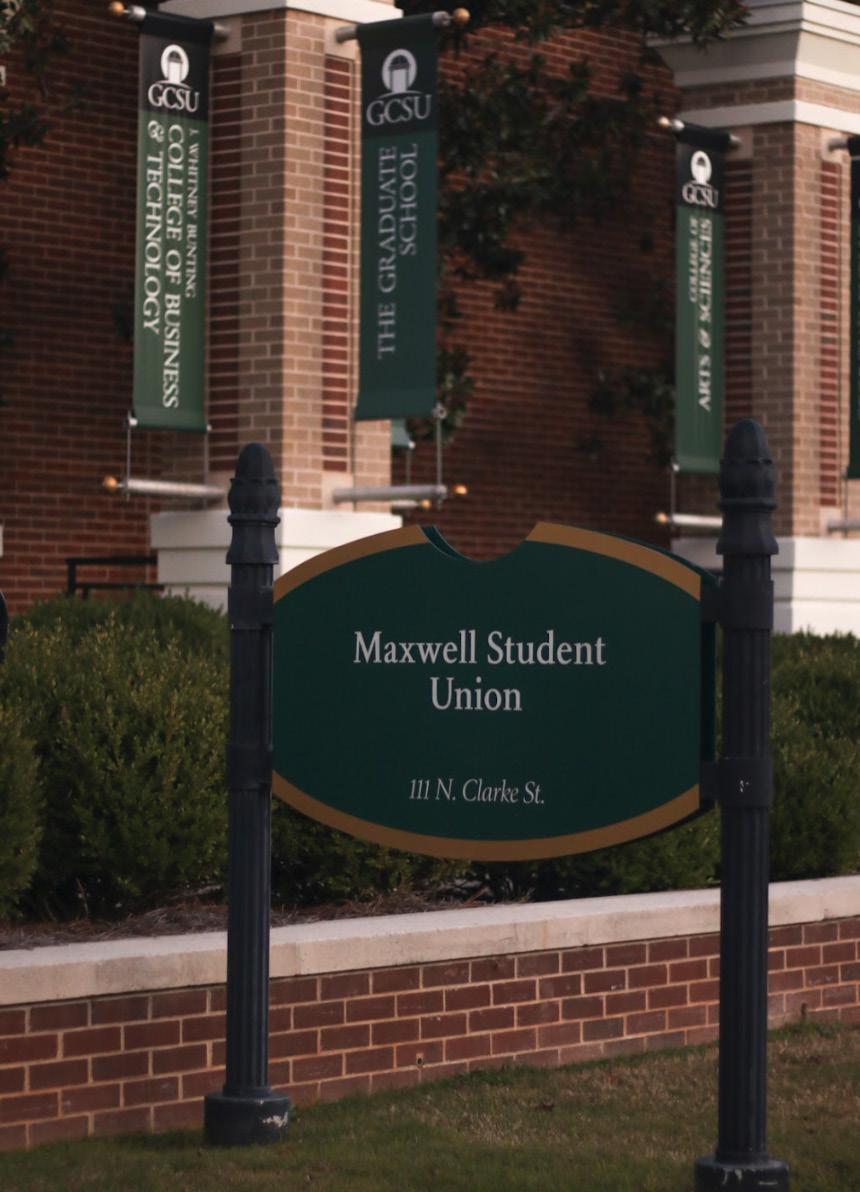
about the quality and variety of food in the Max,” said Serena Myrvold, the Student Government Association president.
“Right now, we are in the process of distributing surveys to gather feedback by placing QR codes around the dining hall so we can fully understand what’s working as well as areas that could be improved upon. Once we’ve gathered enough feedback, we plan to analyze the results and present them to dining services along with student recommendations.”
The Student Government Association closely values student opinion and wants students to know they are there to listen and promote positive changes on campus.
“Transparency and follow-through are key, and we want students to see that their feedback truly shapes campus life,” Myrvold said. New renovation plans in or outside of the Max have not been in recent conversation among GCSU’s Facilities Planning team, Auxiliary Services or Student Government Association. Students report that the dining hall is easier to navigate now with the additional space added.
“We are happy with the renovations done over the summer of 2023,” said Ranee Parker, GCSU’s Director of Capital Planning & Project Management. “I work together with Facilities Planning, Auxiliary Services and the Student Government Association on building renovations and we do not see a reason to renovate the Max further.”
Students have the opportunity to reach out to the “Culinary Council” at GCSU. It is a student-run organization that shares student opinions with the school on the quality and quantity of the MAX’s food, as well as overall experiences.
Continued from page 1
“I was really proud of how I did,” Shanklin said. “We ran this course about a month ago, and I improved by two minutes. That was a big deal for me. Going into next year, knowing that top 15 means something, I’m going to be counting the girls, and I’m going to try and figure out, even before the race, who I need to stick with and what I need to run to be top 15.”
To conclude the championship afternoon, came the men’s 8K race, in which the Bobcat men’s team finished third out of the nine teams running. This was the second consecutive third-place finish, accumulating 93 points.
The Saints also finished first in the men’s 8K, a feat not earned by the college since the last time the Bobcats host-
ed the championship, in 2016, as Flagler College posted 19 points. In the process of making some school history, the Saints also dethroned the Jaguars, who held a six-time champion streak, as Augusta University finished second.
The Bobcats’ performance in the Peach Belt Conference Championship earned them a 10thplace position in the U.S. Track & Field and Cross Country Coaches Association NCAA Division II Southeast Regional Rankings. The Regional Rankings were determined subjectively by a single member coach in each respective region.
GCSU’s Shipley Smith finished with a first-place hold for the Bobcats; however, like Shanklin, he finished one spot shy of earning the all-conference team accolade, placing 16th with a time of 25:41.0. Zach Hily-
er secured a top-20 effort, finishing 19th with a time of 26:21.6, and Noah Boyd placed 26th with a 26:44.5 time.
Three Bobcats set personal records, with Noah Peters finishing 41st with a 27:32.0 effort, Evan
“Previously, last year at the Peach Belt Conference Championships, we were two minutes behind Augusta, and we’ve closed that gap to about a minute, on average,” Smith said. “So that’s exciting for the
ship also earned him Zaxby’s Player of the Week honors at GCSU.
“I’m very pleased with my performance,” Smith said. “I think that all the work we’ve done all season has really paid off. Obviously, one spot shy
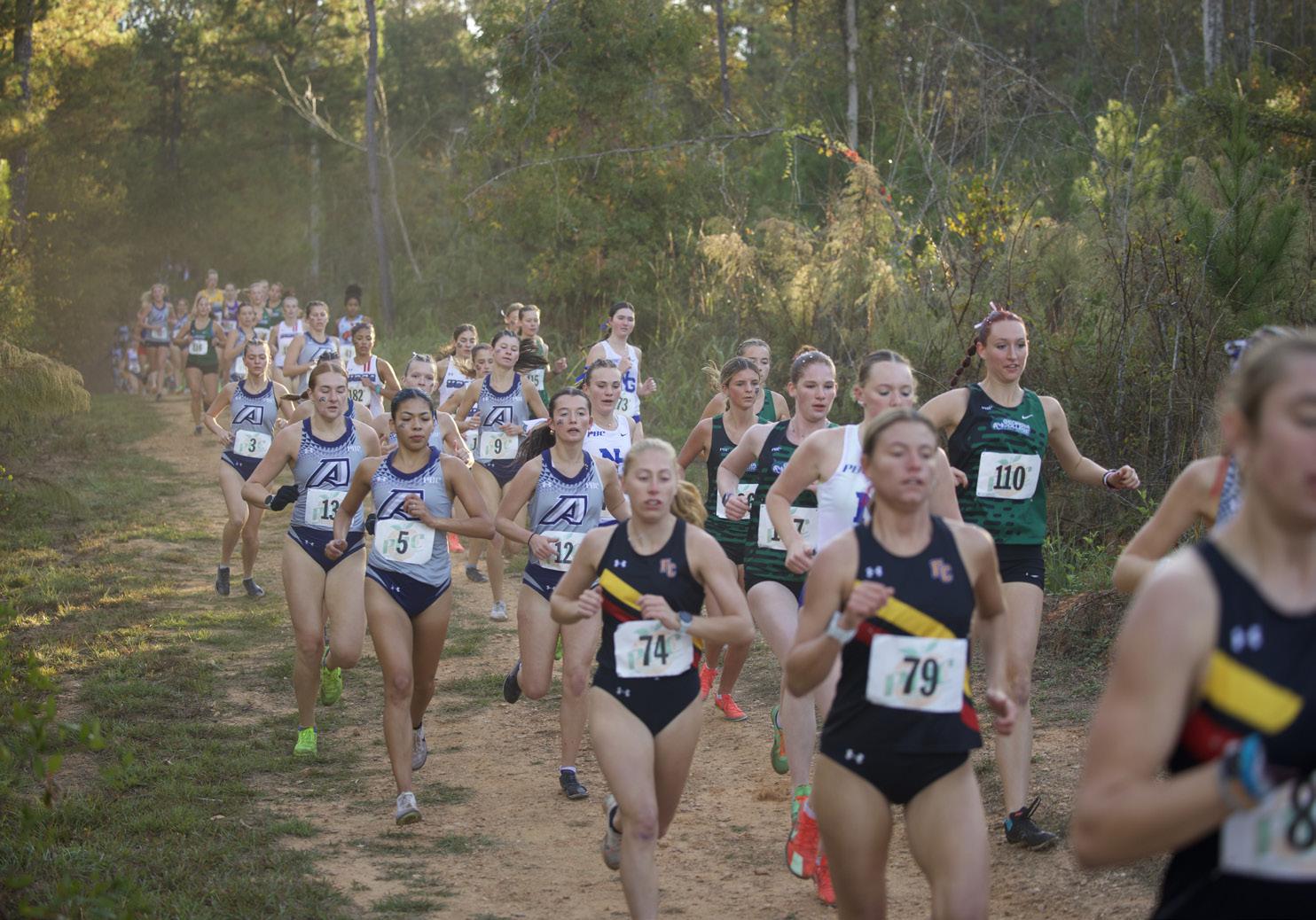
Armstrong finishing 48th with a time of 27:57.2, and Daniel Bell finishing 50th with a time of 28:17.6. Jaycob Wagner was named to the AllPeach Belt Conference Sportsmanship Team.
future of the program. I think the guys did well, and we had a bunch of guys go out there and run really strongly.”
Smith’s performance in the men’s 8K at the conference champion-
of all-conference is pretty disappointing, but to put my name up there with the dominant Flagler and Augusta squads is really exciting for the future.”
The Bobcats conclude their season with a final
meet on Saturday, Nov. 8, as they travel to Wingate, North Carolina, for an appearance in the NCAA Division II Southeast Regional Championship. The women’s race is set to begin at 10 a.m. and the men’s wraps up the afternoon, beginning their race at 11:15 a.m.
“The men rank 10th in the region, so it’s definitely a great vote of confidence there that we know we can be a top 10 team,” said Alexander Bruno, the head coach of the men’s and women’s cross country teams. “While the women were not in the top 10 in the ranking at the moment, I know they’re as good as the men are, and they can be a top 10 team. We’ve got some really high goals for the last two weeks of the season, and it gives everybody one more chance to go right maybe some of the wrongs.”
Bryan Cade Asst. Sports Editor
Graduate student women’s soccer player
Ellie Fuller won the honors of Peach Belt Conference Player of the Week for her outstanding performance, posting a momentum-building hattrick for GCSU in the week ending on Oct. 20.
The Alpharetta, Georgia native helped the Bobcats win both contests during the week, their first in Montgomery, Alabama against Auburn University at Montgomery Warhawks 3-0, then finished off the week with a 5-0 win over the Albany State University Golden Rams at home. These two wins extended the Bobcats’ then-unbeaten streak to eight straight games.
As if the hat-trick was not impressive enough, it is worth remembering that Fuller’s season was shortened because of an ACL injury that happened toward the end of the previous season.
“There are only pos-
itive thoughts,” Fuller said. “Coming off an injury, it was huge. Being able to get on the score sheet after coming back within the month was great, and being surrounded by my best friends on this
She’s definitely the mother of the team
Sheffield
-Lillie
team made it even better. It was one of my favorite moments on this team.”
The Bobcats had double-digit shots entering the second half, yet could not put up a goal before halftime in the game against the Golden Rams. It was after a complete lineup switch by head coach Jack Marchant, which included Fuller, that the momentum shifted for the Bobcats.
Fuller knocked in her first goal of the contest on a looping corner kick, sneaking it into the goal for her second goal of the season. Her
aforementioned first goal came against Flagler in her first appearance of the season on Sept. 9.
“I love Ellie,” said Lillie Sheffield, a freshman player on the women’s soccer team. “She’s a great role model, someone I’ve looked up to on the team. She’s someone I go to when I want help or someone to talk to. She’s definitely the mother of the team.”
This goal quickly lit up the GCSU offense, as they quickly went back onto the prowl, swerving through the Golden Rams’ defenders and smoothly finding an opening, as freshman forward Brittany Bakke crossed the ball over to her fellow forward in Fuller, allowing her to score her second goal of the contest. Bakke later scored her own goal within the next 10 minutes, coming from a string of assists from Sheffield and Mia Palumbo.
“Yes, she has stepped into a leadership role,” Bakke said. “Especially with my position, too.
Having to learn a whole new way of pressing and attacking, and having Ellie in that spot to lead me has been super helpful.”
The Bobcats had four corner kicks in the second half of the contest. Fuller made sure two of them went in, as when the Bobcats had the opportunity for another corner kick at the 64:55 mark in the game, Fuller repeated her first goal of the match, perfectly
season, as then-junior
Ali Amrozowicz poked in three goals in a 4-1 victory over the Christian Brothers University Buccaneers in October.
The Bobcats finished the contest against the Golden Rams with 34 shots; Fuller contributed only three, but the efficiency of each shot was the key to the hat-trick.
“This is, undoubtedly, the best group of newcomers we have had
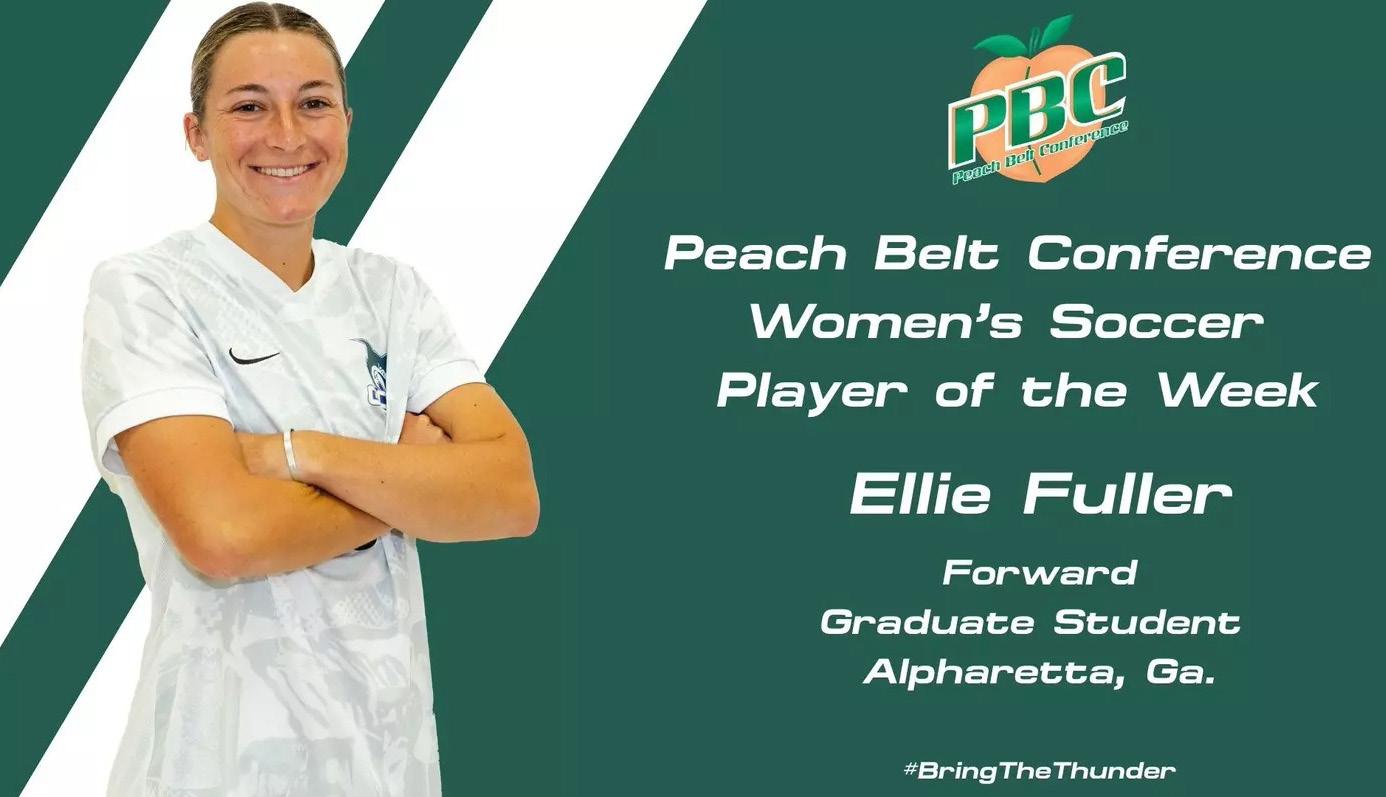
curving the ball into the net, marking the hattrick. This was the first hat-trick of Fuller’s illustrious career, and the Bobcats’ first hat-trick of the current season.
The previous hattrick was from the last
since I’ve been here, and honestly, since I’ve been at this school,” Fuller said. “Each year you go into the season and you’re told the freshman have to earn their spot, and each one of them has. We’re such a close-
knit team that it really doesn’t feel like there’s much of a difference between a grad student and a freshman, which is a huge green flag.” GCSU women’s soccer finishes its regular season with an early-week non-conference matchup against the Eckerd College Tritons on Tuesday, Nov. 4, at 5 p.m. in Milledgeville, Georgia, as they celebrate Youth Day, before preparing for the Peach Belt Conference Tournament, which begins later that week, with the quarterfinals opening on Saturday, Nov. 8, with the seeding finishing up after the regular season concludes for all teams in the conference on Nov. 5.
Benjamin Clark Sports Editor
Small-University athletic programs often do not possess the resources or coaching abilities to successfully equip large quantities of student-athletes to join Major League teams. Georgia College & State University offers a Division II program for its college athletics; however, the school is better known for its academic emphasis on the liberal arts.
Quietly, some Bobcats have steadily trickled into professional sports, culminating in one player reaching the major leagues of baseball and several others earning contracts in the minors.
The most visible success story is that of Josh Taylor, a 2014 graduate who made his debut with the Boston Red Sox in 2019. Once signed as an undrafted free agent, Taylor’s ambition to pursue professional athletics led to a late-career breakout into MLB play.
Behind Taylor are several Bobcats who have transitioned their standout collegiate seasons into professional contracts. One player, Dylan Cook, an Infielder for the Bobcats, signed with the Los Angeles Dodgers in 2016 after a prolific senior season where his batting average exceeded .400, among other accolades.
More recently, Noah Mendlinger was a 2021 graduate who played third base and signed with the St. Louis Cardinals as a free agent. Currently, he climbs through the Cardinals’ minor league system to potentially get a spot on the major league team.
The Baseball program at GCSU has marked many players for successful professional careers and significantly expanded in 2018, when three GCSU players were selected in the Major League Draft. This milestone showed a period of growth for Bobcats baseball and was credited massively throughout local and state media.
In an interview with WGXA, head coach Jason Eller remarked on one player, Logan Mattix, who was drafted to the Houston Astros in the 25th round.
“We are thrilled for Logan and appreciative to the Houston Astros for their interest in our players,” said Eller. “Logan is a tremendous student-athlete with many All-American accolades both on the field and in the classroom. Mattix is a five-tool player and was a centerpiece to back-to-back PBC Tournament Championships. We wish him the best in his journey into professional baseball.”
These individual suc-
cesses are just the most recent additions to a baseball program that, according to public databases, has seen more than 20 of its players drafted or signed to professional baseball and at least one alumnus signed to a major league team.
Other alumni outside of the baseball team have also achieved significant success in their respective sports. Earl Grant, a 2000 graduate, played for the men’s basketball team, helping the Bobcats win 2 consecutive Peach Belt conference titles and a run to the Division II Elite Eight in 2000. After graduating, Grant began a steady climb through the college coaching ranks as an assistant coach at multiple programs before landing a head-coaching job at the College of Charleston.
In an interview with Channel 5 WCSC, Grant pays homage to the head coach at Wichita State, who hired him directly out of GCSU to act as assistant coach for their team from 2004-2010.
“I would not be in this situation if it were not for Coach Marshall giving me a chance six years ago and mentoring me and helping me develop as a coach and person,” said Grant. “He taught me the importance of putting my family first and cherishing them.”
Now, Grant has been
Bryan Cade Asst. Sports Editor
Georgia College & State University softball competed in three fall contests in preparation for its upcoming spring season. Beginning on Oct.5, the Bobcats traveled to play the Mercer University Bears.
On October 10, they competed against the Georgia Military College Bulldogs and concluded the fall games
softball team made an appearance in the Peach Belt Conference Tournament; however, they fell to the Georgia Southwestern State University Hurricanes 8-6 in the quarterfinals. The Bobcats finished with an overall record of 23-24, yet a positive conference record of 14-10.
“We saw a lot of good things in the fall games, but we also saw things we have to work on,” Singleton said.
“I think a lot of good things came out of it, and it’s going to help us im-
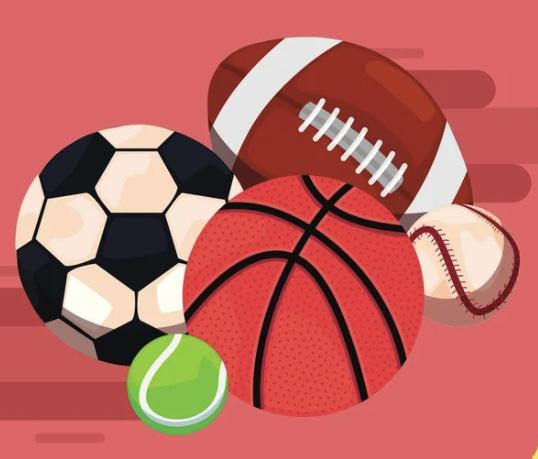
the head coach at Boston College since 2021, making his career as a Division II player stretch into Division I sidelines. Grant’s story is notable for its roots in his love of the game. Rather than reaching for professional ranks as a player, he used his strong Division II playing career to create a strong professional coaching path that carries its own prestige in College Athletics.
One final success story is that of Daria Owen, who played as a midfielder and defender for GCSU women’s soccer from 2006-2008. After her collegiate career, Owen qualified to represent Guyana through her familys lineage and earned a spot on the Guyana women’s national team during the 2010 Women’s World Cup. While her career
in professional soccer was largely halted after her debut appearance on the world stage, she still held the spotlight during World Cup competition, acting as a significant marker of athletic achievement.
Each story illustrates the various careers that GCSU student-athletes have pursued, extending from their original love for their respective sports. Grant’s professional success is rooted in his love for basketball and his continued success as a coach. Owen’s international appearances showed how smaller-school’s players can reach top competitive environments through national eligibility and skillful play. Finally, the Baseball team’s ability to funnel top players into the MLB draft is a marker of their own suc-
Garrett from Georgia State University and right-handed pitcher Ryleigh Sapp from Lipscomb University.
“These fall games are so important,” said Reina Checo, a junior utility player on the softball team. “I think chemistry plays such a big role in softball. You have to be comfortable with the people you’re playing next to, and when every year, you’re getting new people added to the team, it’s important in the fall, when you have that time to build that
cess and dominance in the Division II league. For student-athletes at smaller schools, gaining exposure is the main challenge. Division II schedules see fewer televised games and a majority of draft attention gravitates toward high-profile Division I programs. This reality has pushed GCSU players to pursue summer leagues and independent games where scouts can evaluate their skills against their competition. Importantly drawn from each success story is one notion: passion is what matters. Each student-athlete has understood their position, their challenges and their ambitions in their careers. Each one has also used these understandings to successfully and skillfully break into professional play.
GCSU as a D2CCA All-Southeast Region first-team member and NFCA Division II All-Region team member. Jones leaves a significant gap in the starting lineup, having led the team in earned run average the previous year with a 4.34, while throwing 124 and 1/3 innings and punching out 93 batters in the process. However, while the Bobcats lost several seniors from the previous year, they were able to maintain a senior presence through

with a final contest against the Georgia Southern University Eagles on October 24. The Bobcats were scheduled to compete in a fourth game against the Gordon State College Highlanders; however, it was canceled due to inclement weather.
“It was really good competition,” said Jacy Singleton, a sophomore right-handed pitcher on the GCSU women’s softball team. “It really pushed us, and I’m glad that we played those teams in the fall season because it’ll prepare us for the postseason, where we’ll play teams like that as we get deeper in our season.”
In the previous season, the GCSU
prove and work harder in the season and prepare for the spring. I think these fall games help us figure out where things will end up in the spring and motivate people to compete for the positions they want to secure.”
The Bobcat softball team enters the 2026 season with a plethora of new players, including five incoming freshmen, catcher Jordan Counts, outfielder Maddi Lowery, outfielder Halley Nobles, left-handed pitcher Kennedy Pickett and infielder Sam Story. Coach Brittany Johnson also brought in two transfers, right-handed pitcher Sydney
chemistry, that you take advantage of it.”
The Bobcats aim to build on their success from the previous season; however, they must fill a prominent spot in the lineup and rotation, as 2025 seniors Kam Caldwell and Shelby Jones concluded their time as Bobcats in the previous year. Caldwell posted elite numbers, including a .401 batting average and 1.104 on-base plus slugging percentage.
She also managed twenty doubles, five triples and three homeruns, as well as a favorable walk-to-strikeout ratio. Caldwell also parts ways with
the coaching staff, as graduate student Divina Checo joined the Bobcats for the 2026 season as a graduate assistant.
“First and foremost, it’s a great opportunity for her,” Checo said. “I know how much Divina loves softball. I think that it’s a great opportunity for her, and it’s good for me to have a familiar face as a support system.”
The GCSU softball team is set to open its season for the second consecutive year against the Young Harris College Mountain Lions, as they host them for a doubleheader Saturday, Jan. 31 at 2 p.m. and 4 p.m.
Kate Walker A&L Editor
In October, the American Society for the Prevention of Cruelty to Animals sponsors Adopt a Shelter Dog Month annually to encourage people to give dogs in shelters a second chance.
In Milledgeville, the Baldwin County Animal Shelter, at 1395 Orchard Hill Rd, rescues dogs and cares for them until they are adopted or transferred to another facility. On any given day, more than 40 dogs call the shelter home.
To celebrate Adopt a Shelter Dog Month, this reporter sat down with Tracy White, director of the Baldwin County Animal Shelter, to talk about the joys and challenges of adopting shelter dogs and how Georgia College & State University students can support the local shelter. White joined the shelter staff earlier this year.
Question: What is the shelter’s current capacity for the dogs, including how many can the shelter take care of at one time?
Answer: I think it’s up to 80 animals (dogs and cats) in the shelter. At the moment, I think we’ve got about 60. We don’t like to be up to the high level in this shelter because the fewer we have in the shelter, the more chance we have to get them adopted or rescued.
At the moment, I think we’ve got about 40 shelter dogs. I’d say about 32 adult dogs and the rest are puppies, which are all ready for adoption.
Q: Tell me why a student or community member should adopt a shelter dog, and what are the steps they can take to adopt a dog at Baldwin County Animal Shelter?
A: Everyone should adopt a shelter dog; they are the most loving dogs that you can get. They’re very loyal and everyone deserves a second chance, and so do these dogs. The process is you come in and have a look at the dogs, fill out an application form and get approved, and then you can

take your forever pup home.
Q: Dogs, or any pet really, come with a lot of responsibilities, so who might not be the ideal person to adopt a dog?
A: I would say people who just don’t have the time. The dogs and puppies are part of your family, they’re like your
children. You wouldn’t leave your children 14, 15, 16 hours a day. They need medical care, they need to be taken care of, they need to be loved on. So, people who can’t give their dog time are the type of people who shouldn’t adopt these dogs.
Q: How can students support shelter dogs if they are unable to adopt at this time?
A: They can sign up for Shelter Buddies. They come (to the shelter), they get trained in what the procedures are here, and they can come anytime between the hours of 1 p.m. and 4 p.m. They can take dogs out for a walk, they can sit in the kennels with the dogs and socialize, and just basically they can come and love on the dogs.
Q: What do you think students should know before adopting a dog?
A: Students really should know whether they have the time for the dogs. Because these are shelter dogs, sometimes they need a few weeks to decompress, a few weeks to understand that this is their forever home. Sometimes the first couple of weeks they might poop in your house, but you just have to give them time.
Q: Are there any common misconceptions about adopting from a shelter?
A: Most people think they (shelter dogs) are aggressive and not nice dogs, just because they’re strays. Yes, we do get some aggressive dogs that we
can’t adopt out, and we do get dogs with behavior problems. I think a lot of people don’t come to the shelters because a lot of the dogs that we have here are pit bull mixes, so a lot of people are scared of them. But basically, all these dogs are loving, and people really should come and have a look.
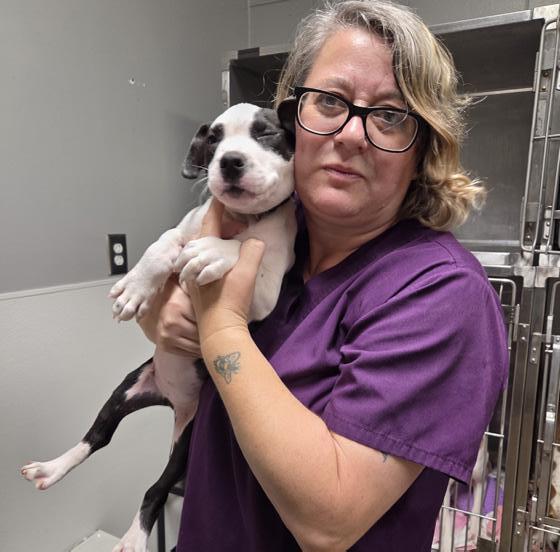
Q: What types of dogs do you usually see coming into the shelter?
A: A lot of dogs coming into the shelter are pit bull mixes, or pit bull with lab mixes. A lot of people in the community are actually scared of pit bull mixes, so that’s why they have such a bad rap, and a lot of people won’t adopt them. But I felt like that when I moved down here. I moved down here from upstate New York, and this is the first time I’ve been to an area where there’s so many pit bull mix strays. When I first started here, I was scared of them until I realized there was nothing to be scared of, that they are really loving dogs.
Q: Why do you think this area has a higher number of pit bull mixes?
A: I think a lot of the reasons why we have a lot of strays here are due to the community not spaying and neutering their animals. We could pick up 10 to 20 strays a week, and I think basically if we spayed and neutered our pets that there wouldn’t be so many strays out there in the community, because they just keep on breeding.
Q: Do you have any favorite adoption stories of dogs who were here and finally got adopted?
A: We have quite a few. We have such a close bond with these dogs, and I have such a good team of staff that we socialize with these dogs every single day. At every adoption we get really happy that they’re going but upset that they’re going at the same time, because we do form a bond with everyone here. If you are interested in adopting, email the shelter at ac@baldwincountyga. com or call 478-445-5514. The shelter, at 1395 Orchard Hill Rd, is open from 1 p.m. to 5 p.m. Monday through Friday for students to meet adoptable dogs. Photos and biographies of available dogs are updated regularly on the shelter’s Facebook page.
Margaret Scarbrough Contributing Writer
At GCSU, there are benefits and challenges to spring registration. With 7,100 students as of fall 2024, total enrollment “has reached an alltime high in its 136-year history”, according to GSCU’s website. In fact, applications for the 2024 entering class saw a 44% incline from that over the previous two years.
GCSU President Cathy Cox responded to this statement by tying it to the COVID-19 pandemic, and explained how online learning and smaller class sizes have contributed.
“To some extent, I think Georgia College has benefitted from the negative experience many of our students had with online learning during the pandem-
ic,” Cox said. “Almost all of our academic-year courses for undergraduate students are held in-person, in small classes. Our students thrive in discussion-based environments. They like knowing their professors and that their professors know them.”
However, an increase in student population means more competition on registration day. Every fall, students wake up early and log on in hopes of securing their ideal schedule. However, a smooth registration period is not always guaranteed. Full or waitlisted classes, invalid Course Reference Numbers, account holds and time conflicts can all interfere with the process.
From Oct. 27-31, GCSU students shared their registration ex-
periences and tips for reducing stress during registration week.
“To be completely honest, it was a very stressful experience because I went in expecting it to be straightforward and easy, and it was not that at all,” said
I had to enter everything manually,” Elsbernd said. “I was definitely more nervous my second year after the negative experience.”
Another factor that greatly affects the process is priority registration. This means that students
able to register earlier.
While this accommodation does not guarantee every student with priority will get the classes they need, it increases their chances.
“Getting the email that I had priority registration really helped me

Lilly Elsbernd, a junior early education major.
Elsbernd registered her freshman and sophomore year, with this year being the first she is not required to.
“The site crashed and
are allowed to register on the first day classes open. Although not widely talked about, it is quite common. For example, students with academic accommodations, seniors and athletes are
Julia Jensen | Art Director
and it makes registration a whole lot less stressful,” said Tori Segal, a junior mass communications major, “Usually I will sit down after my advisor tells me the classes I need to take and make a sched-
ule, so the process is quicker the morning of.” Registration is a complicated process for many, but like Segal, students can use strategies to lower stress and anxiety around the process.
GCSU suggests making an appointment with an academic advisor, reviewing DegreeWorks, making multiple plans and setting an alarm early in the morning to be ready to register on time. It is also helpful to make an academic advising appointment early.
Registration week comes with many possible challenges including technological issues, time management, competitiveness and class requirements. Using strategies that will help students be prepared allows for a smooth running registration process.
GCSU students say parking is tougher than ever
Jane Carr Staff Writer
GCSU students say parking has become one of the semester’s biggest frustrations, following a series of new policies implemented alongside the university’s record undergraduate enrollment.
Beginning this fall, Parking Services introduced a $50-per-semester elective permit fee, stricter lot assignments for residential students and a new commuter permitting process that was initially advertised as a lottery. Many commuters and residents alike say the changes have led to confusion over zones, longer morning routines and, for some, an increase in parking tickets.
Brian English, associate director of Parking & Transportation Services, said the department’s overhaul stems from a broader evaluation of campus transportation.
“A Parking & Transportation Master Plan Study was launched in the Summer of 2024 with a consulting firm, Kimley-Horn,” English said. “This project was requested by the university to get a clear picture of Parking & Transportation’s overall oper-
Continued from page 1
ations. They identified several policies and procedures that showed a need to be revised, including employee, student and guest parking changes, using the underutilized Irwin Street 498 space parking lot, along with some transportation changes as well.”
For many commuters, the biggest adjustment has been the new permit-selection system. Although students were initially told they would be selected through a lottery, English said the actual rollout more closely mirrored course registration, with permits released by class standings.
Senior psychology major Carly Walker reported she’s felt the impact of shifting commuter availability, especially on the main campus.
“I rarely find parking on the main campus anymore because of the decrease in commuter lots, but there’s always plenty of parking at Irwin St.,” Walker said. “However, the four-hour spots on campus mean that if I get parking on campus, I don’t have to move my car in between classes if I’m on campus for three to four hours.”
Walker, who commutes from off campus, said she under-
“I prefer it to be lighter in the evening, since I have later classes,” said Lauren Ehrhardt, a freshman business major. “With the time change and the weather changing along with it, I find it harder to stay focused during class.”
The earlier darkness can make the days feel shorter and impact motivation, particularly for students balancing classes, work and extracurriculars.
“I’m usually really tired and it feels like it’s later than it really is,” said Molli Burdett, a freshman nursing major. “Which makes me not want to do anything.”
Campus engagement is also impacted by the darker evenings. Outdoor activities such as intramural sports, study sessions on Front Campus or evening trips to the Wellness Cen-
stands the structure of the new system but believes distance commuters deserve priority.
“I think that the parking lottery system makes sense to a certain extent, but I would argue that the students who are truly commuting should have priority,” Walker said.
So far this semester, Walker has avoided tickets, but noted that in previous years, enforcement felt far more relaxed.
According to English, enforcement technology and staffing have also changed.
“Parking enforcement is conducted by two vehicles equipped with License Plate Recognition ,” Walker said. “Parking enforcement employees patrol parking lots on GCSU property and enforce parking violations. Parking enforcement hours are Monday–Friday, 7:30 a.m. to 5:00 p.m.”
The increased enforcement has some residential students feeling the pressure as well. Freshman political science major Madison Connor noted that strict lot assignments have made daily parking unpredictable.
“I can’t even imagine what it’s like for those who commute,” Connor said. “Some-
ter can feel rushed or less appealing.
“I feel like fewer people are outside when it gets darker earlier,” Ehrhardt said.
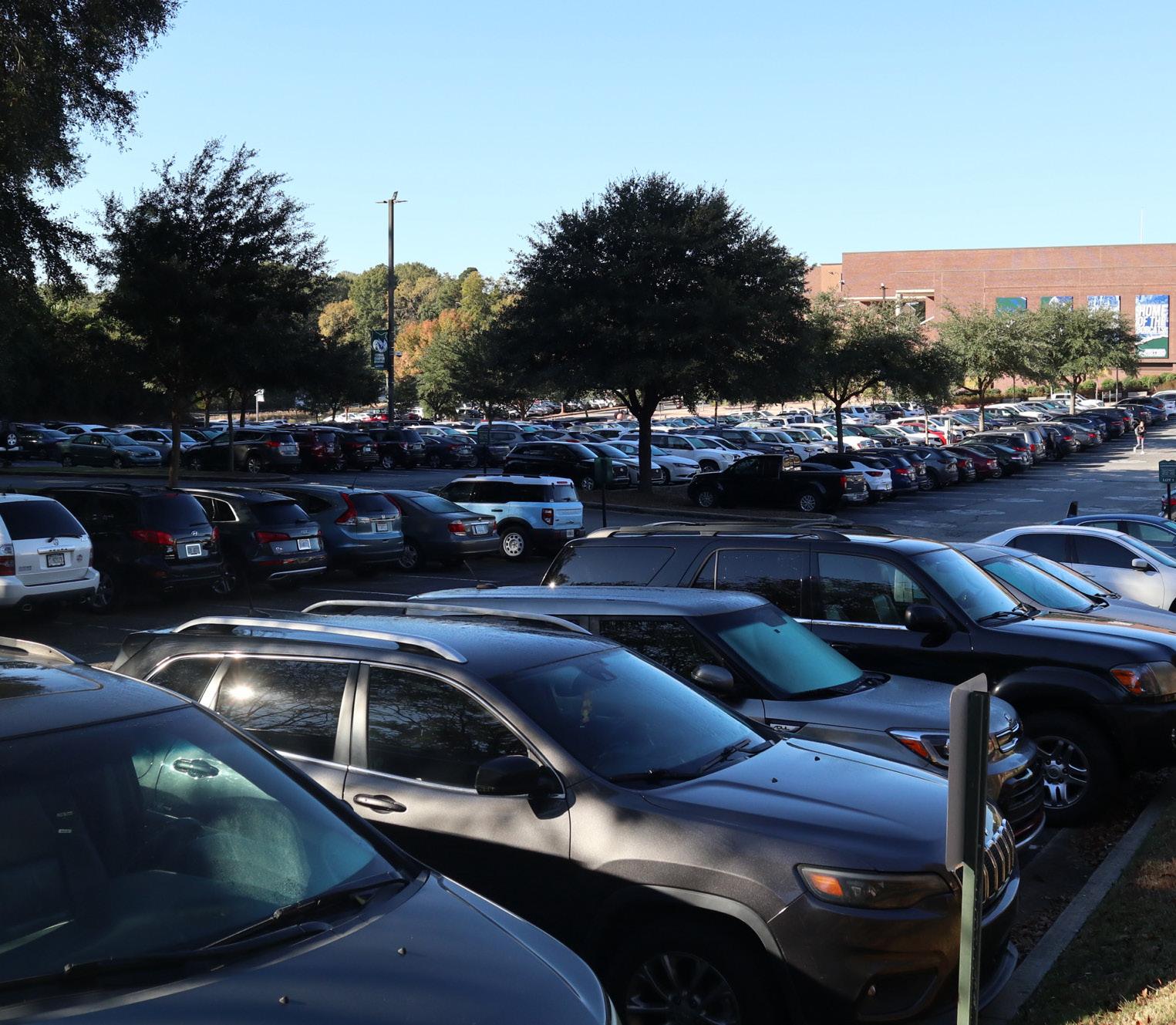
times it’s really hard to find a decent spot, and I end up having to walk a decent amount just to get to the front door of my residence hall.”
Connor said she hasn’t received a ticket herself, but many of her friends have.
“It can be really frustrating sometimes, especially when you’re in a hurry,” Connor said.
According to English, revenue from the elective fee and citations goes back into parking and transportation upkeep.
“The majority of the student P&T mandatory fee is used for Transportation Operations. Still, it is also used for parking lot infrastructure, such as lot maintenance and any new construction that may require parking,” English said.
Despite the growing pains,
“I do find it easier to wake up when it’s brighter in the mornings. I also feel safer walking to the bus stop,” Burdett said.
English said Parking Services will continue to adjust as the semester concludes.
“After the initial rollout of the new parking plan and changes, and at the conclusion of the Fall Semester, Parking Services will be making a few minor adjustments to some of our parking operations to better serve the GCSU community as a whole,” English said.
He also emphasized that the Irwin Street lot, one of the university’s largest, remains available to all permit holders, and shuttles run between the lot and main campus every 6–12 minutes.
For now, with enrollment continuing to grow, students are still adjusting, even if it means leaving home a little earlier and checking lot signage twice.
ral circadian rhythm and has negative consequences for health.”
While the evenings are darker, the early sunrises can be beneficial for students with 8 a.m. classes or morning labs, providing extra daylight to wake up and start their day.
Health experts note that the time change can have physiological effects. According to Britannica, “Changing sleep patterns, even by one hour, goes against a person’s natu-

Despite the potential benefits of extra morning light, many students have questioned the continued need for the time shift.
“I think it should end,” Burdett said. “It is one of the most outdated things we still practice. There is no reason for it.”
Nationally, the debate continues about whether daylight saving time should be kept, adjusted or eliminated. Several states have introduced legislation to make either daylight saving or standard time permanent, though federal approval is required for any nationwide change.
For GCSU students, the time change is more than just setting clocks back. It affects daily routines, study habits and campus life.
CATERWAUL: a shrill howling or wailing noise like that of a cat; commonly associated with a bobcat
On behalf of The Colonnade staff we would like to present our newest submission column, “The Caterwaul.” This is an opportunity for students to share their poetry, flash fiction, photography, drawing, comic strips and more. We are extremely excited to give students more of a place in the paper and for their creativity to be acknowledged and published. We encourage any and all students to reach out and ask questions. In the spirit of GCSU’s mascot, Thunder, the name of this column takes inspiration from all that is a bobcat. Caterwauling is the noise bobcats make often, and that is what The Colonnade intends to do with this column: make noise with your voice.
by Lailan Tobin
The clouded sky drops
Blue bullet pellets
Down drenched dryads
Onto the soft, concrete walkways
Walking every which way
The people with backpacks of bricks
And fleeting time like light pollution
Choose to venture.
My coffee goes cold as the wind
Brushes against the library window
Like a fluffed calico cat,
Begging for attention
From an owner too entranced to look
Back at what is instead of
What was.
I watch as the world moves in waves of
Satisfaction and discontentment
From my orange seat, perched against Wide widowed window panes
Made to show people coming and going
With cell phones and rain boots and Great expectations, nullified by the Slow Monday morning.
These dappled dew drops drop like Firecrackers in the dark,
And I feel the cold atmosphere outside
Chill the space between these library wall’s old bones.
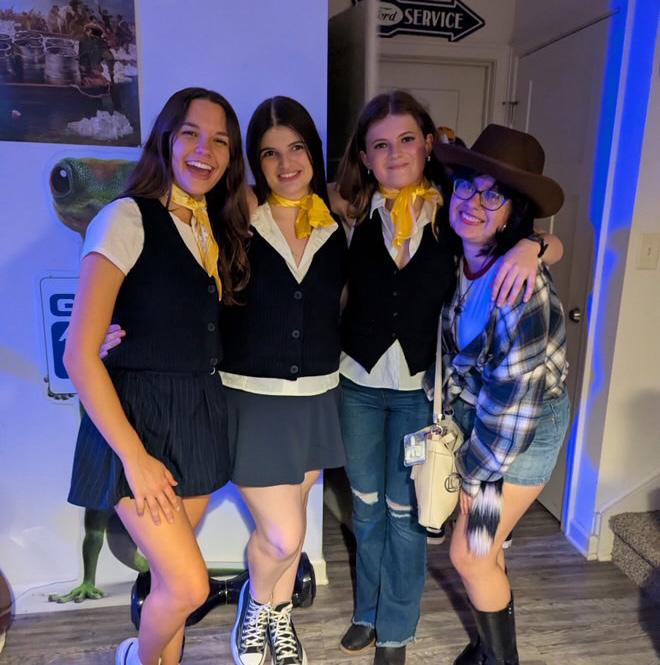
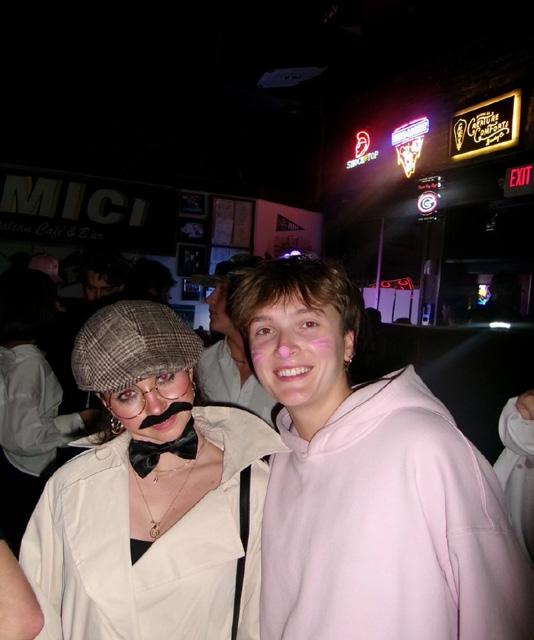


Interested in submitting?
Follow our instgram @thecolonnade or scan the QR code below

